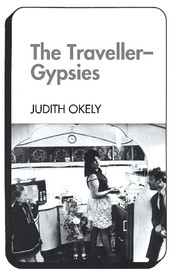Book contents
- Frontmatter
- Contents
- Dedication
- Preface
- 1 Historical categories and representations
- 2 Modern misrepresentations
- 3 Methods of approach
- 4 Economic niche
- 5 Self-ascription
- 6 Symbolic boundaries
- 7 Gorgio planning
- 8 Travelling
- 9 The trailer unit, spouses and children
- 10 Group relations and personal relatives
- 11 Gypsy women
- 12 Ghosts and Gorgios
- Concluding remarks
- Extract from The Scholar Gypsy
- Notes
- References
- Index
1 - Historical categories and representations
Published online by Cambridge University Press: 04 December 2009
- Frontmatter
- Contents
- Dedication
- Preface
- 1 Historical categories and representations
- 2 Modern misrepresentations
- 3 Methods of approach
- 4 Economic niche
- 5 Self-ascription
- 6 Symbolic boundaries
- 7 Gorgio planning
- 8 Travelling
- 9 The trailer unit, spouses and children
- 10 Group relations and personal relatives
- 11 Gypsy women
- 12 Ghosts and Gorgios
- Concluding remarks
- Extract from The Scholar Gypsy
- Notes
- References
- Index
Summary
The Gypsies or Travellers have scarcely written their own history. Theirs is a non-literate tradition, so their history is found fragmented in documents of the dominant non-Gypsy or Gorgio society. (Gorgio is the word Gypsies use to describe non-Gypsies and means outsider or stranger. It is often pejorative.) The history of the Gypsies is marked by attempts to exoticise, disperse, control, assimilate or destroy them. The larger society's ways of treating and identifying Gypsies are fundamental constraints on if not determinants of the Gypsies' actions. Persons who live under the shadow of the title ‘Gypsy’ or its equivalent will make the appropriate adjustments to the larger Gorgio society in which they are embedded.
Some introductory remarks concerning the complexity of locating the persons called Gypsies or Travellers come as a warning. The Gypsies' history cannot be a simple chronology of non-Gypsy written records; these can only provide clues for interpretation. Nor can the complexity be resolved by looking for the ‘real’ Gypsies, who are usually those who fit best the stereotypes of the observer. The very notion of the ‘real’ Gypsy raises more questions than answers.
Long-term participant observation among persons called or calling themselves Gypsies or Travellers can however be informative for both the present and the past. In this study, I shall be drawing on the various records and writings concerned with Gypsies or Travellers mainly in Britain, in order to put my own fieldwork among Gypsies in southern England in the 1970s into context. In turn, such fieldwork should also throw light on the historical records.
- Type
- Chapter
- Information
- The Traveller-Gypsies , pp. 1 - 27Publisher: Cambridge University PressPrint publication year: 1983

